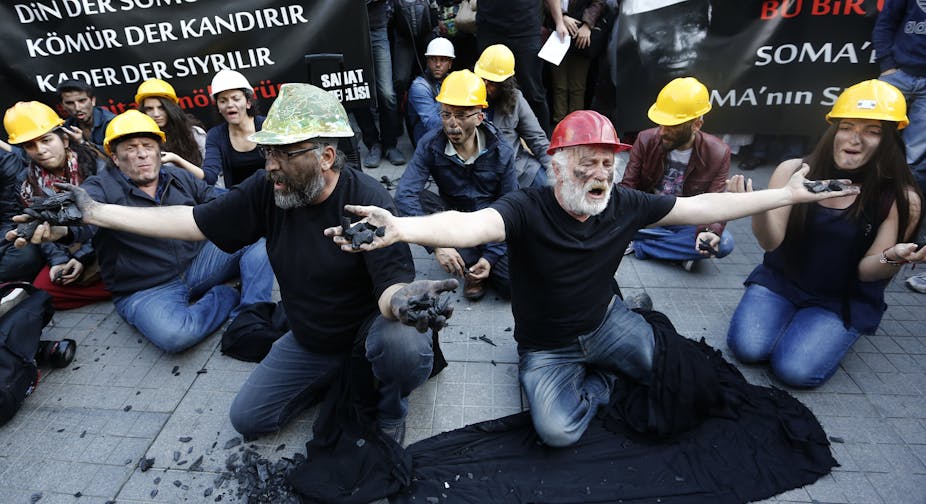One of the worst mining tragedies in Turkish history, the explosion at the Soma coal mine has taken at least 282 lives and many more miners remain unaccounted for. I come from a town 13kms away from the scene of this disaster and, unfortunately, this is not something that comes completely out of the blue.
In most people’s minds the disaster would seem to be an unfortunate industrial accident caused by a technical fault in the electricity system, resulting in a fire – an unfortunate incident that could happen anywhere. But the political economy of this disaster points in a different direction.
Alarm bells
The alarm bells were ringing loud and clear before this disaster, but they fell on deaf ears. To start with the safety record of the mining sector is quite appalling. Before this latest tragedy, Turkey has seen over 1,300 fatal accidents in the mining industry since 2000. Only a month ago the main opposition party asked for a parliamentary investigation into the safety in Soma mines. This was rejected by the ruling AK Party.
When Soma was developing as a mining town in the 1970s, during my childhood, the sector had a strong union structure. Miners were much better protected in terms of safety at work and their labour rights. But as the country experienced economic liberalisation from the 1980 coup d’état onwards, many industrial sectors including mining became open to exploitation.
The regulations for safety at work are often ignored by private companies and there are many loopholes in the checks and controls of these industries. For example, the safety auditing of mines is undertaken by private firms commissioned by mining companies themselves. Their inspections are announced ahead of time, and disrespecting the rules and regulations does not come with a punitive regime.
There is nothing to discourage mining companies from cutting corners in safety at work place.
Excuses, excuses
In the Soma mine disaster, the blame has so far been placed on a technical fault in the electricity system in the mine. But according to the professional groups representing engineers in the mining sector, if the right technical system is used in mines then the occurrence of such a technical fault would be almost impossible.
So either it was not a technical fault in the electrical system that caused the disaster, or the system used in the mine was not up to the expected standards. In both cases though, there was a key responsibility to ensure that thousands of miners’ lives should not daily have been put at risk.
The public is angry in Turkey. Although the government might once again shrug its shoulders and deny overall responsibility for the disaster, this time they might be facing a different ball game. The visit to Soma by the prime minister, Recep Tayyip Erdoğan, yesterday led to scenes of people attacking his car and shouting “murderer” and “thief” at him.
Whenever there is a disaster in Turkey it is either the fault of nature, in the case of earthquakes and floods, or some of sort technical fault that could not have been prevented. “These [accidents] are usual,” the prime minister insisted at a press conference in Soma. The human factor – the socio-economic and political vulnerabilities that help cause and confound these disasters – is eclipsed.
Responsibility to protect
It is time for Turkey and its leaders to bear some responsibility for disasters like the Soma tragedy. It is the state’s responsibility to provide human security, with its key elements of a life that is based on freedom from fear, freedom from want and freedom to live in dignity. The authority to govern comes with the responsibility to protect your citizens.
In the Soma mine disaster there is no need to go too far to look for culprits. It is time that the state and its actors should start to take stock seriously of how much they care about human security in Turkey.

